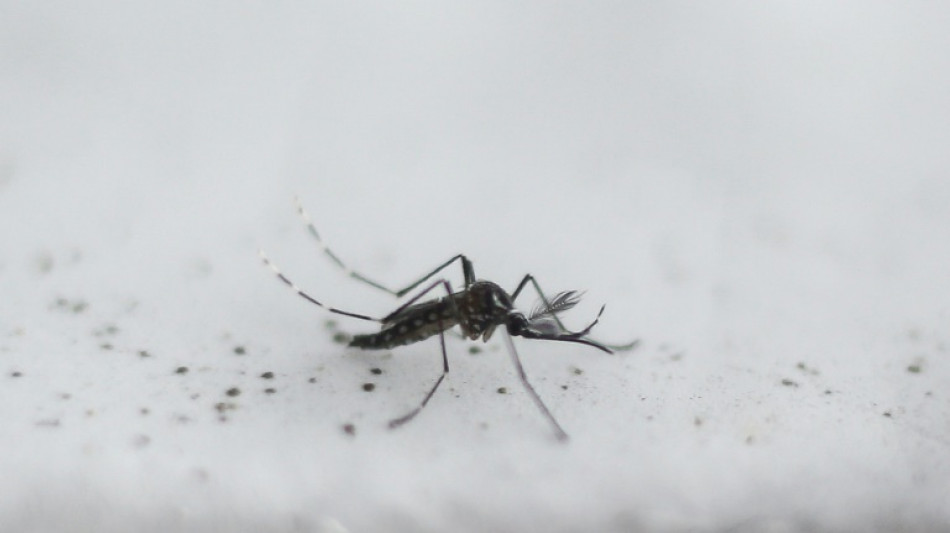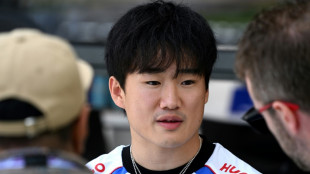
-
 Asian markets edge up but uncertainty rules ahead of Trump tariffs
Asian markets edge up but uncertainty rules ahead of Trump tariffs
-
Nintendo's megahit Switch console: what to know

-
 Nintendo to unveil upgrade to best-selling Switch console
Nintendo to unveil upgrade to best-selling Switch console
-
China practises hitting key ports, energy sites in Taiwan drills

-
 Oil, sand and speed: Saudi gearheads take on towering dunes
Oil, sand and speed: Saudi gearheads take on towering dunes
-
All eyes on Tsunoda at Japan GP after ruthless Red Bull move

-
 'Image whisperers' bring vision to the blind at Red Cross museum
'Image whisperers' bring vision to the blind at Red Cross museum
-
Hay shines as New Zealand make 292-8 in Pakistan ODI

-
 Other governments 'weaponising' Trump language to attack NGOs: rights groups
Other governments 'weaponising' Trump language to attack NGOs: rights groups
-
UK imposes online entry permit on European visitors

-
 How a Brazilian chief is staving off Amazon destruction
How a Brazilian chief is staving off Amazon destruction
-
Meme politics: White House embraces aggressive alt-right online culture

-
 China launches military drills in Taiwan Strait
China launches military drills in Taiwan Strait
-
US senator smashes record with 25-hour anti-Trump speech

-
 Brazil binman finds newborn baby on garbage route
Brazil binman finds newborn baby on garbage route
-
US senator smashes record with marathon anti-Trump speech

-
 Trump advisor Waltz faces new pressure over Gmail usage
Trump advisor Waltz faces new pressure over Gmail usage
-
Niger junta frees ministers of overthrown government

-
 Trump set to unleash 'Liberation Day' tariffs
Trump set to unleash 'Liberation Day' tariffs
-
Boeing chief to acknowledge 'serious missteps' at US Senate hearing

-
 Real Madrid hold Real Sociedad in eight-goal thriller to reach Copa del Rey final
Real Madrid hold Real Sociedad in eight-goal thriller to reach Copa del Rey final
-
Nuno salutes 'special' Elanga after stunning strike fires Forest

-
 PSG survive scare against Dunkerque to reach French Cup final
PSG survive scare against Dunkerque to reach French Cup final
-
Sundowns edge Esperance as crowd violence mars quarter-final

-
 Nottingham Forest beat Man Utd, Saka scores on Arsenal return
Nottingham Forest beat Man Utd, Saka scores on Arsenal return
-
Elanga wonder-goal sinks Man Utd as Forest eye Champions League berth

-
 Stock markets mostly advance ahead of Trump tariffs deadline
Stock markets mostly advance ahead of Trump tariffs deadline
-
US movie theaters urge 45-day 'baseline' before films hit streaming

-
 Saka scores on return as Arsenal beat Fulham
Saka scores on return as Arsenal beat Fulham
-
Third-division Bielefeld shock holders Leverkusen in German Cup

-
 Ball-blasting 'Torpedo bats' making waves across MLB opening weekend
Ball-blasting 'Torpedo bats' making waves across MLB opening weekend
-
Newsmax shares surge more than 2,000% in days after IPO

-
 Thousands of Hungarians protest against Pride ban law
Thousands of Hungarians protest against Pride ban law
-
GM leads first quarter US auto sales as tariffs loom

-
 Tesla sales tumble in Europe in the first quarter
Tesla sales tumble in Europe in the first quarter
-
No 'eye for an eye' approach to US tariffs: Mexico

-
 NFL club owners back dynamic kickoffs, delay tush push vote
NFL club owners back dynamic kickoffs, delay tush push vote
-
Trump 'perfecting' new tariffs as nervous world braces

-
 Trump nominee says to press UK on Israel arms
Trump nominee says to press UK on Israel arms
-
French court says Le Pen appeal ruling could come before presidential vote

-
 The battle to control assets behind Bosnia crisis
The battle to control assets behind Bosnia crisis
-
Prabhsimran powers Punjab to IPL win over Lucknow

-
 Mass layoffs targeting 10,000 jobs hit US health agencies
Mass layoffs targeting 10,000 jobs hit US health agencies
-
Tiger's April Foolishness: plan to play Masters just a joke

-
 Myanmar quake toll passes 2,700, nation halts to honour victims
Myanmar quake toll passes 2,700, nation halts to honour victims
-
Turkish fans, artists urge Muse to cancel Istanbul gig

-
 US seeks death penalty for accused killer of insurance CEO
US seeks death penalty for accused killer of insurance CEO
-
UK govt moves to block sentencing guidelines for minority defendants

-
 Trump puts world on edge as 'Liberation Day' tariffs loom
Trump puts world on edge as 'Liberation Day' tariffs loom
-
Swedish journalist jailed in Turkey kept 'isolated': employer


Djibouti experiments with GM mosquito against malaria
Tens of thousands of genetically modified mosquitos are being released every week in Djibouti as the tiny Horn of Africa state experiments with a new weapon against an unprecedented malaria surge.
East Africa faces a deadly new threat from the arrival of Anopheles stephensi, a mosquito native to Asia and the Middle East that thrives in urban areas and is immune to insecticides.
The World Health Organization (WHO) says the species is a key factor in an unprecedented spike in malaria cases in Djibouti and Ethiopia, and has been found in six other African countries so far.
In 2019, Abdoulilah Ahmed Abdi, health adviser to Djibouti's presidency, heard about a new invention being used primarily in Brazil against a dengue-carrying mosquito.
The so-called "Friendly" mosquito, created by British biotechnology firm Oxitec, is a genetically modified male that carries a protein ensuring its offspring will not survive.
Since only females bite, the idea is that GM males can be released in vast numbers without posing an additional risk to humans.
Djibouti launched the programme in May with the release of 40,000 GM mosquitos and on October 6, began weekly releases that will run for six months.
"We are trying to find with our partner Oxitec an innovative and sustainable solution that could have an impact on the whole region and the continent at large," said Abdi.
"We are very proud of it. It's an initiative for all Africa," he added.
Abdi said results were expected by mid-2025 and that Djibouti was also building a factory to produce the mosquito for shipment across Africa.
- Hopes and challenges -
Oxitec has released well over one billion GM mosquitos in Brazil and Florida in the United States, where it targets the dengue-carrying Aedes aegypti.
Its studies indicate it can reduce wild populations by 90 percent or more.
"There's nothing better at finding the biting disease-transmitting female mosquito than a male mosquito," Neil Morrison, Oxitec's chief strategy officer, told AFP.
He emphasised the Djibouti programme was still at a pilot stage.
"Early next year, we'll start to figure out how many mosquitoes we'll need to release to deliver suppression," he said.
GM mosquitos are controversial with some environmentalists.
A 2019 report led by GeneWatch UK said Oxitec's technology risked altering the evolution of mosquitos and the way diseases spread, in potentially dangerous ways.
It questioned Oxitec's claims of efficacy, saying it could inadvertently release many females alongside its sterile males, or simply push wild mosquitos into neighbouring areas.
Oxitec insists its GM mosquito is "completely harmless and non-toxic" and regulators cleared it for deployment in the US in 2022.
But if GM mosquitos must be continuously released to be effective, there is the question of cost -- a key factor in Africa, which accounts for around 95 percent of the 600,000 malaria deaths each year.
Oxitec refused tell AFP how much its mosquitos cost to governments and private buyers.
Outside experts are taking a wait-and-see approach.
"We are very supportive of innovation," said Dorothy Achu, WHO's head of tropical and vector-borne diseases in Africa.
She said WHO was working on a regulatory framework to measure the impact of GM methods.
"Initial results are very promising but we need things that are sustainable over time and we need impact on wide areas," said Achu.
O.Karlsson--AMWN

